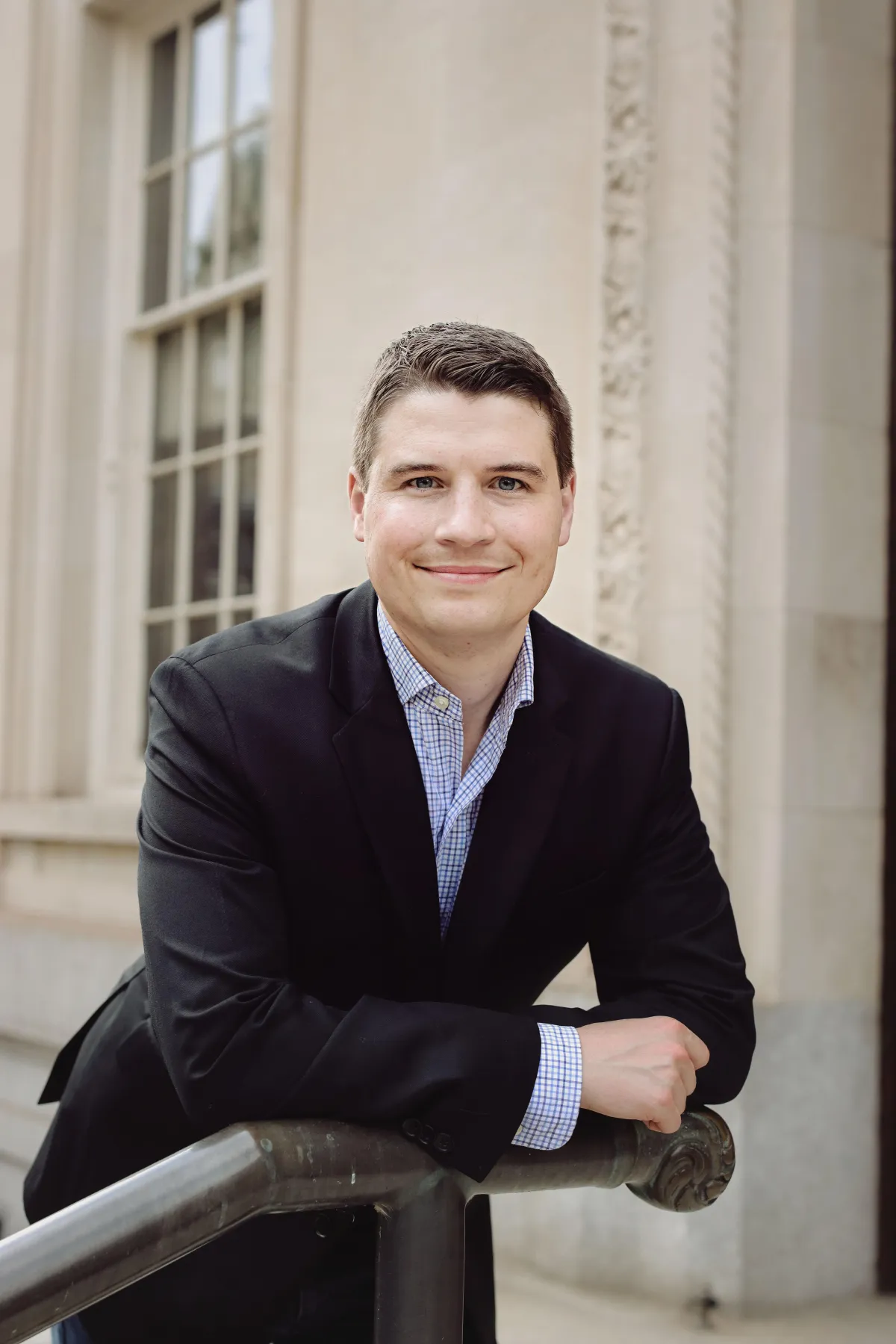From $50K in Debt to Millions in Assets with Real Estate Mentor and Philanthropist Mathew Pezon |EP 45

Ever Been Curious About Investing in Real Estate?
Stephen and Sharlene sit down with real estate investor, mentor, and philanthropist Mathew Pezon. Learn about his experience as a mentor at The Real Estate Lab, a nonprofit organisation dedicated to teaching real estate investing to disadvantaged communities.
Discover how his childhood experiences shaped his drive to succeed and his refusal to accept mediocrity. Mathew generously shares the invaluable lessons he's learned on his journey from being $50,000 dollars deep in debt after college to creating a $25 million dollar portfolio in real estate.
Key Takeaways:
Learn How To Develop The Mindset Of A Successful Investor
Committing to a Single Course of Action to Achieve Mastery and Success
Continuous Learning And Self-Improvement
Giving Back To The Community
Chapters:
04:44 Overcoming Scarcity Mindset, Embracing Money As Tool
09:36 Investment Philosophy, Risk Tolerance, Asset Preferences, Retirement
11:41 Driven By Success, Learning About Investing
14:23 Determined To Focus On Real Estate Investing
16:48 Transition From Spain To Us, Investing Experience
You'll understand the value of mentorship and the importance of surrounding yourself with people who have already achieved what you aspire to. Mathew's wisdom, compassion, and dedication to helping others will ignite a fire within you to pursue your dreams with renewed determination.
He shares his own journey of unlearning the "money doesn't grow on trees" mentality and realizing that wealth is attainable.
Listen and get inspired and equipped with the tools you need to transform your life through the power of real estate investing and mentorship.
Episode Resources
Help support the show by sharing it with a friend and give us a review on Apple Podcast or Spotify.
Read the Transcript Below:
[00:00:00]
Mathew Pezon: I had literally nothing, less than nothing. I had $50,000 of debt. I had no cash. And so I was up against all this debt. I had to make these payments, and then my boss told me I was the worst employee he ever had. And the economy was terrible at the time in 20 10, and it was a very scary time for me.
[00:00:17]
Sharlene Licciardello: Today, we are joined by real estate investor, Mathew Pizon. He went from being knee deep in debt to amassing $25,000,000 in real estate assets.
[00:00:25]
Stephen Licciardello: Mathew shares the valuable lessons he's learned along the way from the power of mentorship to the importance of developing a successful mindset.
[00:00:33]
Sharlene Licciardello: Stay to the end to hear our thoughts on how you can approach achieving financial freedom. Let's dive in. Welcome to rewrite your story. The podcast where change begins with you.
[00:00:43]
Stephen Licciardello: We're your hosts, Stephen and Sharlene.
[00:00:45]
Sharlene Licciardello: As professional coaches and mentors trained in various modalities, we have helped and of people
[00:00:50]
Stephen Licciardello: Bridge the gap between the person they are
[00:00:53]
Sharlene Licciardello: and the person they want to be.
[00:00:54]
Stephen Licciardello: We bring you conversations with real people who have overcome real setbacks.
[00:00:58]
Sharlene Licciardello: You will walk away with practical steps to find more clarity, alignment, and success in any area you want to improve.
[00:01:05]
Stephen Licciardello: So join us and discover how you have the power to overcome, to change, and to rewrite your story.
[00:01:11]
Sharlene Licciardello: So pick up the pen. Your new chapter starts now.
[00:01:16]
Stephen Licciardello: We've got Mathew Pease on here all the way from Pennsylvania. And, Mathew, welcome to our show.
[00:01:23]
Mathew Pezon: Yeah. Thank you so much for having me. I'm excited.
[00:01:25]
Stephen Licciardello: We're excited as well because you're gonna bring us a wealth of knowledge around wealth creation, how to change your mindset, and how you turn a passion, a side hustle into an income. But before we get started, tell us a little bit about your journey and what has brought you along this path.
[00:01:42]
Mathew Pezon: Sure. So I am from the 4th generation of engineers, and I thought growing up that I wanted to, go into engineering school, work for a big company, and that's the path that I took. So I did chemical engineering school at a university near me and started working in industry, and it was in 2010. It was difficult to get jobs. And so I was placed into a rotational program, which was a a good thing. And my first boss told me that, so it was an IT role, and I was chemical engineering. And we're building servers. There wasn't really much documentation, and my, instructions or mentorship at the time told me that I was the worst employee he ever had and the company should fire me.
[00:02:25]
Mathew Pezon: And that was when I realized that I didn't wanna rely on a a boss, a big company. I wanted to chart my own path. And then I I started exploring real estate after that, and I've been in this business for for about 10 years, and I just went full time recently. So there's a lot there to unpack, but I'd like to say that I'm a recovering engineer.
[00:02:46]
Stephen Licciardello: A recovering engineer. When we say full time, you have accumulated in that time $25,000,000 worth of assets. Now tell us about how that evolved. Tell us a little bit about, you know, going from 0 to hero in wealth creation and what that took you to do.
[00:03:06]
Mathew Pezon: Sure. So maybe I'll take a little bit of a step back before college and some of my professional ambitions. But growing up, you know, I was the kid going around the neighborhood selling candles and different things to try to get to summer camp. I mean, my parents divorced when I was very young. And so on my mom's side, there were 5 kids. On my dad's side, there were 7 kids, including us. So there was there were a lot of mouths to feed, lots of things that needed to get done. And so we were okay, but there were things I wanted to do and, you know, going to summer camps and different activities.
[00:03:36]
Mathew Pezon: And if I wanted to do them, I had to make it happen. So I grew up from a young age recognizing that if I wanted to do things, no one was gonna give them to me. Right? I had to go get the. And and my parents are supportive, you know, getting me to a good college and different things, and we didn't want for anything. But some of the extra things I wanted to do, I had to make happen. So that was always a value that had been instilled in me from a young age that if I wanted to get it done, I had to go out and get it. So when I started after college, I had literally nothing, less than nothing. I had $50,000 of debt.
[00:04:08]
Mathew Pezon: I had no cash. And so I was up against all this debt. I had to make these payments, and then my boss told me I was the worst employee he ever had. And the economy was terrible at the time in 2010, and it was a very scary time for me. I was just getting started. There was no safety net for me. And so I had my back against the wall in a lot of ways. I didn't have a lot of, financial support and other things, and I had to go I had to go figure it out.
[00:04:33]
Stephen Licciardello: Why property?
[00:04:35]
Mathew Pezon: So when I went so I did a Fulbright scholarship, and I had always wanted to speak another language, and that was something that I I was driven to do. And I knew that I I needed a way to pay for it, so I I I applied for funding and got it. And so I went to business school. And in business school, that's when my eyes got open to business. I learned about assets. I learned about debt. I learned about business strategy, HR, IT, and it it really opened my eyes. And and module that stuck out to me was debt.
[00:05:08]
Mathew Pezon: And I understood mortgages. I understood real assets. I was never the genius guy who was gonna be a whiz at trading and trading options and all this stuff. That just wasn't me. But I understood a real thing, a house, a resident pays the rent, The debt is on the property. I I just understood it. It made sense to me. It was real.
[00:05:27]
Mathew Pezon: I had experience with it. And in business school, that's where I found rental properties.
[00:05:32]
Stephen Licciardello: Awesome. Tell us tell us a little bit about the the mindset shifts that you had to make, in order to accumulate such such assets?
[00:05:42]
Mathew Pezon: I came from a place of lack the there was never enough, that, we couldn't do things because so money was kind of like a barrier in many ways. So I had to understand and unlearn that way of thinking. The money doesn't grow on trees mentality, the, you know, well, we can't do that because we don't have enough or there's never enough. That way of thinking, I had to really unlearn that, and it took a long time. It took many years of of reading, of thinking, journaling, meditating, and and trying to unwire some of the ways that I had thought. And seeing wealth and money as something that now that that is attainable. It's it is possible and something that isn't finite. It's infinite, and it's a it's a tool.
[00:06:32]
Mathew Pezon: And and so it took many years of education and unlearning what I had learned and thought was true but wasn't and didn't serve me. And, I read and of books on it, and I decided that I I just wanted to go a different path.
[00:06:46]
Sharlene Licciardello: So what would you say, I guess, was the turning point that took you from, okay, like, I really can't afford this, having that old mentality and then wanting to strive out of the. Like, what made you break out from that?
[00:07:00]
Mathew Pezon: Yeah. So I was always driven to succeed and to achieve. And so when I realized that the model that I thought would work wasn't working, namely, if I get this education and get this job, I can achieve success, grow up the corporate ladder. When I saw that that wasn't working, it made me rethink many things. And that is when I discovered that it's very rare to really make it on the corporate ladder, that there are other ways, and that's when I discovered entrepreneurship. Frankly, I owe that boss a favor. I didn't know it. It's it's been 13 years, but hosts 14 years, but I I owe him a favor.
[00:07:42]
Mathew Pezon: It was really in that moment that I realized. And the drive that I've always had inside pushed me through, and I knew that I had to find another way.
[00:07:49]
Stephen Licciardello: You went from a a part time, and now this is your full time. And you've got a lot of stuff on your website, and you help people with their properties and all that. Tell us the steps it took, and and what were the challenges that you faced?
[00:08:03]
Mathew Pezon: Sure. So there were many, and I've made all the mistakes. So when I say these things that I'm about to say, it's because I messed them all up. So first, you have to decide, and you have to commit. So and it doesn't have to be real estate. It could be any business. That's just what I chose. But you have to make a choice that you're going to do the, and you're not going to accept mediocrity, and you wanna go all in on this eventually and that you're super passionate about it.
[00:08:30]
Mathew Pezon: So all those things should be true because it's going to be hard, and there are going to be challenges along the way. So something has to drive you. You have to feel something in your gut that I'm going to do this. And if you don't feel that, maybe it's not the thing for you, or maybe you need to grow into that feeling, but you need to have that drive. Next, you need to get educated. So once you figure out, I think I like this, you really have to dive in and get educated on that thing. I've read and of books about real estate, listened to thousands of podcasts just like this to really hone my skills and my education. And then you need after deciding and, and committing, and then after you get educated, at that point, you need to start taking the next Stephen.
[00:09:13]
Mathew Pezon: So for real estate, it's what's my credit score, what are my cash savings, am I bankable, and then understanding what properties do I wanna buy in what locations. It will be different for everyone, but you need to look at what is the next step to take for this business. And then just break down that long term goal. I saw myself, and I journaled about it. You know, I'm gonna own 50 units someday or 50 apartments. And I broke down from 5 years into the future, every single year, what I needed to do and accomplish to get to that point. And so I'd say planning and and journaling and writing it down is is key. And then once you have your plan, you have to execute, and you have to keep that education loop spinning because you can't you can't just stop educating once you execute.
[00:09:57]
Mathew Pezon: I did that for a while, and then I made mistakes and for things that I didn't know how to do. So So keep getting educated. Keep executing. Don't suffer from analysis paralysis, and keep pushing. So I'd say those are the top five things to really make it happen. Yeah.
[00:10:11]
Stephen Licciardello: Yeah. I really love that. You need to keep educating and don't stop that. You and, Mathew, if someone's starting out in property, what would your advice be as in the first step or knowing, like, what to buy, how to buy are, and? Like, there's so many are and Variables. Variables when it comes to buying property.
[00:10:34]
Mathew Pezon: Sure. I think they need to before they look out there, I think they look need to look in here. In other words, what's my investment philosophy? What's my tolerance for risk? What do I want to invest in and why? For me, my why was that I wanted to be able to retire from my corporate job in my thirties, and I needed cash flow to do that. So I chose residential real estate houses, and, also, I liked the liquidity. They're easy to buy and sell, and that was what I wanted. Now someone who maybe they are maybe they're an attorney or more legal minded, maybe they wanna do land entitlements, or maybe they don't want the headaches of the residential tenants. Maybe they just want more of a hands off experience, so maybe they want to go into self storage. Or maybe they have a realty company or some other type of company where they need a and, and so maybe they wanna go into commercial or office space and just be their own tenant.
[00:11:32]
Mathew Pezon: Right? So it really depends. Those are examples, but it really comes back to the listener, to you. What do you want and why? So there's a so many different types of real estate, but what do you value? Because you should invest for you, and it has to align with your philosophy.
[00:11:48]
Sharlene Licciardello: Absolutely. So what like, you mentioned that you just decided to do property. Was the something like a catalyst, or did you see someone who is in that area that you, like, got your inspiration from? What was it that made you decide to go in that pathway?
[00:12:04]
Mathew Pezon: Yeah. So my family owned their own homes growing up, and so I was used to that. And then when I went to college, I was paying a lot of money to live in, like, a small box, and the amenities weren't really that good. And I thought, what am I paying all this money for? And I just thought, wow. This is, like, this is a really good deal for them. And and I just I thought, wow. I I'm kind of throwing my money away. And and so when I rented for about, I guess, maybe 8 or 9 years after moving out of my parents' house, it it always kinda bothered me every month.
[00:12:39]
Mathew Pezon: And so that combined with wanting to achieve, wanting to succeed, to feel like I was, you know, worth something and and and, you know, wanted to accomplish something and for childhood reasons and other things that I've worked through over the years, I just felt that I was I was always driven, and I just felt, why am I sending this rent check? And so I learned about how debt works and how investing works. I learned how if the rent exceeds all the expenses and there's profit left over and the and the property goes up over time, I I just learned the math, and I decided this is what I want my investment vehicle to be. And it was the corporate world not working out and seeing that I might not be able to grow there and achieve what I wanted to achieve. It it was all those things. There wasn't one moment where, like, the light switch just went on. I mean, it was it was a process.
[00:13:27]
Stephen Licciardello: You, not only have you accumulated your own portfolio, you now help others in accum in signing up their own property portfolio. Take us a little bit about around that journey and how you bring your clients on that journey.
[00:13:43]
Mathew Pezon: Absolutely. So, actually, only philanthropy that I coach and teach. There's no fee that I charge. And I I was actually, my wife and I had their 3 month old twins, so I had to step down as the director. But I was the director for a year of a nonprofit called The Real Estate Lab in Allentown, Pennsylvania. And what The Real Estate Lab does, it's a mission that I'm very aligned with. It's providing knowledge networks and capital to disadvantaged demographics that never would have had the opportunity to learn about real estate, get into the business, have the network of people to tap into, lenders, contractors, insurance agents, property managers. And it's a 12 week program.
[00:14:23]
Mathew Pezon: We teach from soup to nuts, from beginning to end, starting with the mindset of the investor, all the way to selling properties at the and, how to invest. It's it's about closing the wealth gap in the US by teaching real estate investing, and it's a program that I'm super passionate about because it's changed a lot of things for me, and I think everyone should have access. You know? It doesn't matter where anyone's from or what their background is. Everyone should have an equal opportunity to become wealthy, and they could choose not to. But just because no one told anyone or they were historically excluded from it doesn't mean they shouldn't know. Right? So it real estate was huge for me, and I wanna pass that on.
[00:14:59]
Stephen Licciardello: In your, years of entrepreneurship, have there ever been any other enticing side hustles that have come your way that you think, oh, that's a really good opportunity, but maybe have not been for you. So someone who doesn't actually wanna do, for instance, real estate, what are some other opportunities that you could suggest?
[00:15:21]
Mathew Pezon: So I was in the beginning, before I really decided that I wanted to do real estate investing, you should ask my wife. I was thinking about this and that and the other thing, and now I was looking at in high school, I worked as a you know, in and Dunkin' Donuts, so I was thinking about that. I was thinking about an insurance agency, and I had all these different ideas. So but once I decided on my side hustle, that was it. I mean, I put my blinders on, and I said, I'm going to do this thing, and I'm going to do it with all of my ability. I'm not considering any other type of real estate in any other location, only investment real estate between and families, and it's only in these areas. And once I decided, it eliminated a lot of the churn. Well, should I do the, and should I do that, and how do I know, and does this feel right? And I I I looked at many opportunities, and I picked 1, and I went with it.
[00:16:12]
Mathew Pezon: And I went all in on it for as a side hustle. I didn't try to do 3 or 4 at a time. Yeah.
[00:16:17]
Stephen Licciardello: Yeah. And I think that's really good because a lot of people have a plan a, plan b, plan c, plan d, plan e, f, g
[00:16:25]
Mathew Pezon: Right.
[00:16:25]
Stephen Licciardello: Up to zed, and none of them were. But you only had your plan a, and that's all you made it work because there was no plan b.
[00:16:33]
Mathew Pezon: Well, that that's right. And, you know, I I'm I'm not a burn the boats kinda guy and succeed at all hosts, and this is the only option. I mean, there were other options, namely stay in my current job where I was earning a decent salary, decent living. But I think there's truth to FOCUS. I you know, someone And heard this somewhere. FOCUS is an acronym for find and course until successful or something like that. Right? Like, it's I I just decided that if I spread myself too thin, I'm gonna fail at everything, and I need to I I need to put in my 10000 hours to really get this skill because it takes 10000 hours to develop expertise. And I learned that Yeah.
[00:17:17]
Mathew Pezon: Living in Spain. Right? Like, every day was Spanish. You know? And you can't become fluent trying to learn Spanish, French, Chinese, all at the same time. Right? And I just I learned that. I I I play multiple instruments, and you just you can't you have to focus on and. You can't try to play too many at the at the same time. It it's the same with businesses. And I think people get distracted with too many ideas.
[00:17:36]
Stephen Licciardello: Yeah. I love that. And I love that focus, one course until successful. I think that's a really powerful statement. Mathew, what role have mentors played in your transformation?
[00:17:46]
Mathew Pezon: Huge. They've been enormously important. When I came back from Spain to the US and I started investing, I knew that I wanted to do it. I understood the concepts, but I didn't know how. And I joined a group of investors that every morning so every Saturday morning, while other young people in their young twenties, mid twenties, they were, you know, maybe they were up late, you know, the night before or whatever, hanging out, drinking, whatever. I was getting up on Saturday mornings going to see these properties with a group of investors in their fifties sixties, and I get breakfast with them every Saturday. You know? And I had no clue. I I remember asking these guys, like, how do you de winterize a property? I mean, all you do is just pour water down the drains.
[00:18:30]
Mathew Pezon: I didn't know that. I I started from no knowledge, nothing. It was through going around to see all these properties with this group of investors that I learned all the skills, and I asked questions, and they they were excited to share their knowledge, and I was excited to learn. So mentors were huge for me. It changed everything.
[00:18:47]
Sharlene Licciardello: It's so important, isn't it, to have someone that you can go to to seek that, like, mentorship, the leadership, and just get that advice from. So just for our audiences as well, if someone wanted to rewrite the life story, what advice could you give them today?
[00:19:02]
Mathew Pezon: I think that it starts with desire, and it starts with a reason why because it's hard to make those changes to unlearn and relearn. It's easy to fall back to old habits. So I think there has to be a really strong driver, and the person has to have motivation to to really do it. And so I I think rewriting the life story on the outside first starts on the inside. And so it has to start the, and it there has to be a reason why. It could be for you know, I have young kids. It could be for health reasons. It could be for financial reasons.
[00:19:42]
Mathew Pezon: It could be any reason, but it has to start inside.
[00:19:45]
Sharlene Licciardello: Yeah. Absolutely. Well, Mathew, if you were to go back and rewrite your own life story today, what would that look like?
[00:19:52]
Mathew Pezon: Probably would have started investing in real estate sooner. I might have gone to college for an investing type major to learn or economics to really start learning these principles sooner. But I would I probably wouldn't have gone to engineering school. I probably would have gone to business school. But at the same time, I learned many valuable skills that I still apply. So there's not much the I would redo or change other than get started sooner in this business.
[00:20:18]
Stephen Licciardello: And there's no time like today if you haven't taken the opportunity to start sooner as well. Mathew, it's been great having you on our show today. Thank you so much for joining us. If you wanna know more about Mathew and what he does, you can head over to his website and his socials, and all the links will be in today's show notes. Mathew, thank you so much.
[00:20:39]
Mathew Pezon: Stephen and Sharlene, it's been a pleasure. Thank you.
[00:20:43]
Sharlene Licciardello: Thank you for joining us on the Rewrite IS Story podcast.
[00:20:46]
Stephen Licciardello: We hope you found this episode enlightening.
[00:20:48]
Sharlene Licciardello: For more information on the topics discussed, please visit our website at Stephen com.
[00:20:53]
Stephen Licciardello: Don't forget to subscribe to our podcast on your favorite platform. Share with your friends and follow us on social media at and.
[00:21:00]
Sharlene Licciardello: Until next time. Stay informed and inspired.
[00:21:02]
Stephen Licciardello: This is Steven and Sharlene signing off from the Rewrite Your Story podcast. Thank you and stay blessed.
Disclaimer: This podcast is not a substitute for professional medical or psychological advice, diagnosis, or treatment. Always seek the advice of your healthcare provider or a qualified mental health professional with any questions you may have regarding a medical condition or mental health concerns.
Stephen and Sharlene
© Copyright 2024. Stephen and Sharlene. All rights reserved.
We’re on a mission to help you create transformation.




